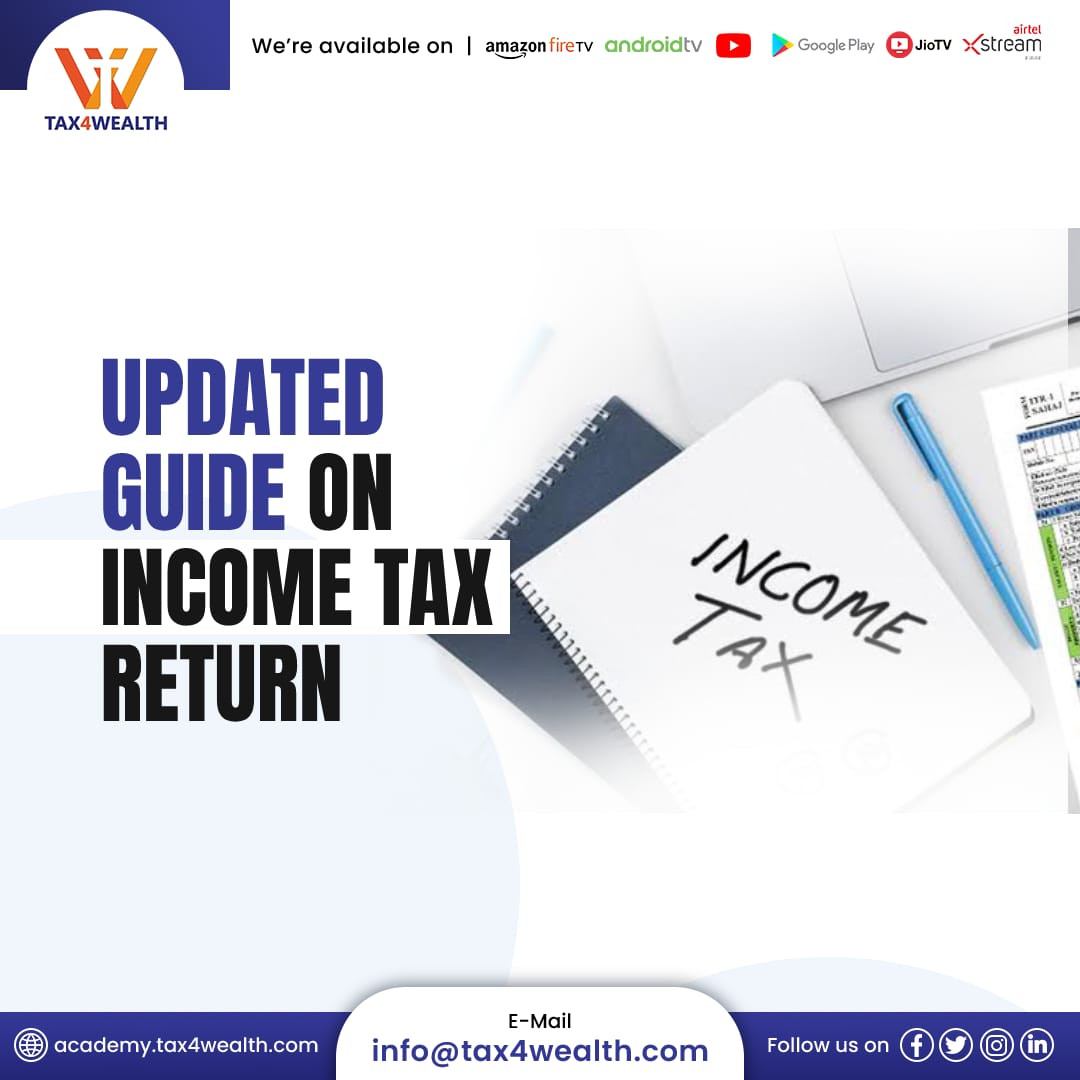
Updated Guide on Income Tax Return (ITR)
Section 92 CD- Modified Return:
The specifics governing the submission of modified or revised returns are outlined under Section 92CD of the Indian Income Tax Act. It has been divided into several sub-sections.
Section 92CD specifies requirements for filing updated income tax returns, whereas Section 92CC contains all steps for creating an APA (ITR). Everyone who engages in an APA shall submit an amended ITR within three months following the termination of the APA. This amended return needs to account for the change in your taxable income brought on by signing an APA. By Section 92CD Modified Return.
Any taxpayer who submitted an ITR by Section 139 before the date of such an agreement is subject to this Section. The purpose of these revised returns is the same as one served by a return filed under Section 139. Section 92CD also describes how to submit updated returns and finish your Assessing Officer's evaluations (AO).
Return filed under Section 92CD:
A modified return must be filed within three months of the end of the month in which Section 92CD entered into the aforementioned arrangement for an assessment year for which an advance pricing agreement was entered.
If you want to learn how to file income tax return, Click here 👉 how to file ITR online
Sub-sections of Section 92CD of the IT Act:
The Income Tax Act of India's Section 92CD has several sub-sections. The following succinct summary of Section 92CD subsections pertains to:
- Anyone who wishes to employ an APA is required by Section 92CD (1) to submit a revised ITR within three months.
- Section 92CD (2): The same rules for refunds under Section 129 would apply to all other 92CD provisions. There are a few exceptions, though.
- Section 92CD (3): This paragraph deals with situations when an assessment or reassessment is completed before the time limit for submitting amended returns has expired. If such a return met the standards of a subsection, the AO would reassess/recompute your total income for the relevant assessment year (1).
- Section 92CD (4) deals with circumstances where assessment or reassessment procedures for an assessment year before an advance pricing agreement are still ongoing. Once they have received your amended return and taken into account the agreement and modified ITR, the AO will wrap up the assessment/reassessment processes.
- Section 92CD (5) mandates that an AO complete the sub-section (3)-required assessment/reassessment procedure within a year of the fiscal year in which a modified ITR was filed. This subsection shall be applicable notwithstanding the application of Sections 144C, 153, or 153B.
- Section 92CD (6): This establishes the period during which the assessment or reassessment for a certain assessment year is regarded to be completed. It also clarifies that the term "agreement" used in Section 92CD of the Income Tax Act is referred to in Section 92CC. The procedure is complete after an assessment or reassessment order has been granted or whenever the time frame outlined in Section 143(2) has passed.
According to Section 119(2), returned (b)
To help taxpayers who are truly in need, the CBDT may allow the income-tax authority to accept a late application or claim for any deduction, exemption, refund, or other relief even after the period specified under the Act for doing so has passed.
Income Tax Guide, Revised Return (ITR-U) under Section 139(8A)
The new section 139(8A) of the Income Tax Act of 1961 was included in the Budget of 2022. The taxpayer may submit an “Updated Return” (also known as an ITR-U) by Section 139(8A). From April 1, 2022, Section 139(8A) is in force.
Taxpayers who have not submitted a return or who have filed returns under sections 139(1)- Original, 139(4)-Belated, and 139(5)-Revised may file updated returns. Introducing this option is intended to encourage voluntary tax compliance and decrease litigation.
Also, read; The Procedure to File ITR After Due Date
1. Individuals who may file an updated return under section 139 (8A)
Individuals, HUFs, Firms/LLPs, Companies, AOPs, BOIs, and others are all entitled to submit Updated returns under Section 139. (8A). To file the revised returns, however, the taxpayers must fulfill the following requirements.
- A taxpayer may only file an updated return if their initial return contained mistakes or omissions or if they had not previously filed their income tax return.
- Only if the person must reveal any extra income that was previously omitted and must pay more taxes, can the Updated return be filed.
2. People who cannot file an updated return under Section 139 (8A):
Individuals, HUFs, Firms/LLPs, Companies, AOPs, BOIs, and others are all entitled to submit Updated returns under Section 139. (8A). But in the instances listed below, the revised return cannot be filed.
- If a return of loss has occurred.
- If it results in a larger refund or a reduction in the tax obligation.
- Books of accounts, other documents, or other assets have been requisitioned under Section 132, or a search has been commenced under Section 132. (A).
- A survey that is not required by Section 133A has been conducted (2A).
- If any assessments have been made or are finished.
- If the Assessing Officer is aware of the Assesses' compliance with the relevant acts.
- If any information received under Section 90 or Section 90A was transmitted to him before the due date for the amended return.
- If any legal actions had already been taken before the revised return was submitted.
- If the taxpayer falls under the group of people the board has been made aware of.
3. Deadline for Filing Updated Returns:
The deadline for submitting amended returns is two years after the conclusion of the applicable assessment year.
- For AY 2020–21 (FY 2019–20): The amended return must be submitted by March 31, 2023.
- For AY 2021–22 (FY 2020–21): The amended return must be submitted by March 31, 2024.
- For AY 2022–23 (FY 2021-22): The amended return is required by March 31, 2025.
4. Additional Tax or Penalty Owed:
Only the penalty must be included when filing updated income tax returns. The following are the penalties for filing an updated return: -
- If the revised return is filed within 12 months of the end of the relevant assessment year, there is a 25% penalty on the total amount of tax and interest owed.
- If the revised return is filed more than 12 months after the end of the applicable assessment year, there is a penalty of 50% of the total tax and interest due.
Note: Section 140B outlines how tax, interest, fees, and additional income tax are to be paid and calculated on revised returns.
5. The filing ITR Form Requires updated return and details
The Income Tax Department has notified "ITR-U" to file a revised return by Section 139. (8A). The information needed to complete an ITR-U is listed below. In addition to the general information, the ITR-U requires the following information.
- Do you meet the requirements outlined in section 139's first, second, and third provisos to be qualified to file an amended return? (8A).
- Choosing the ITR Form (ITR 1, 2, 3, 4) to file a revised return
A.Reasons for updating your income
- Previous return not filed
- Inaccurate income reporting
- Choosing the incorrect heads of income
- A decrease in carried-forward losses
- Reduced unabsorbed depreciation (e)
- Reduced tax credit under Section 115JB/115JC
- An incorrect tax rates
- Others
- Do you submit the amended return for the period?
- A maximum of 12 months after the conclusion of the applicable assessment year.
- 12 to 24 months after the conclusion of the pertinent evaluation year.
For more update, Visit us at: https://academy.tax4wealth.com/blog/
No comments yet, Be the first to comment.













